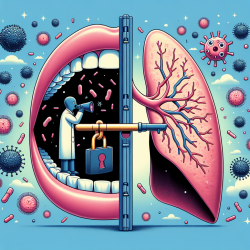As speech-language pathologists, our role in managing dysphagia often intersects with advocating for improved oral health, especially in vulnerable populations such as residents of complex continuing care (CCC) facilities. A recent pilot study, "Monitoring Oral Colonization as a Risk for Pneumonia in Complex Continuing Care: Lessons Learned from a Pilot Study," sheds light on the intricate relationship between oral hygiene and pneumonia risk.
The study monitored oral colonization in 10 residents over three months, collecting oral swabs at five time points. Contrary to expectations, the analyses did not show a clear pattern of increasing pathogenic bacteria as time post-dental hygiene service increased. This unexpected result highlights the complexity of oral colonization and suggests that routine oral care alone may not be sufficient to manage pneumonia risk effectively.
Here are some actionable insights for practitioners:
- Understand the Complexity: Oral microbial colonization is highly variable. The study found that commensal bacteria, such as Neisseria and Viridans Streptococci, were prevalent, while pathogenic bacteria were rare. This indicates that good oral hygiene practices might not always translate to reduced pathogenic colonization.
- Interprofessional Collaboration: Given the complexity of oral colonization, speech-language pathologists should collaborate closely with dental hygienists and nursing staff to develop comprehensive oral care plans tailored to each patient's needs.
- Monitor Oral Dryness: The study found no significant relationship between oral dryness and bacterial colonization. However, maintaining adequate salivary flow remains essential for overall oral health and comfort.
- Individualized Care Plans: The variability in oral colonization patterns underscores the need for personalized oral care strategies. Regular assessments and adjustments to care plans are crucial.
Encouraging further research in this area is vital. The pilot study's findings indicate that larger, more detailed studies are needed to unravel the complexities of oral colonization and its impact on pneumonia risk.
To read the original research paper, please follow this link: Monitoring Oral Colonization as a Risk for Pneumonia in Complex Continuing Care: Lessons Learned from a Pilot Study.










